
Sappho was an Archaic Greek poet from Eresos or Mytilene on the island of Lesbos. Sappho is known for her lyric poetry, written to be sung while accompanied by music. In ancient times, Sappho was widely regarded as one of the greatest lyric poets and was given names such as the "Tenth Muse" and "The Poetess". Most of Sappho's poetry is now lost, and what is extant has mostly survived in fragmentary form; only the Ode to Aphrodite is certainly complete. As well as lyric poetry, ancient commentators claimed that Sappho wrote elegiac and iambic poetry. Three epigrams formerly attributed to Sappho are extant, but these are actually Hellenistic imitations of Sappho's style.
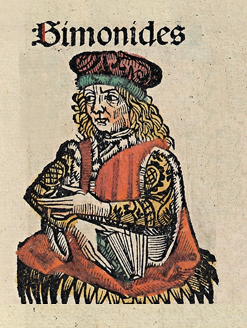
Simonides of Ceos was a Greek lyric poet, born in Ioulis on Ceos. The scholars of Hellenistic Alexandria included him in the canonical list of the nine lyric poets esteemed by them as worthy of critical study. Included on this list were Bacchylides, his nephew, and Pindar, reputedly a bitter rival, both of whom benefited from his innovative approach to lyric poetry. Simonides, however, was more involved than either in the major events and with the personalities of their times.
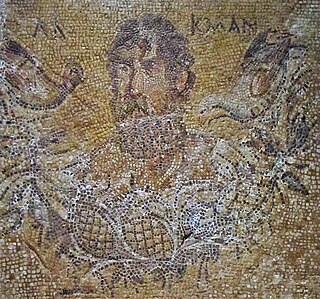
Alcman was an Ancient Greek choral lyric poet from Sparta. He is the earliest representative of the Alexandrian canon of the Nine Lyric Poets. He wrote six books of choral poetry, most of which is now lost; his poetry survives in quotation from other ancient authors and on fragmentary papyri discovered in Egypt. His poetry was composed in the local Doric dialect with Homeric influences. Based on his surviving fragments, his poetry was mostly hymns, and seems to have been composed in long stanzas made up of lines in several different meters.
Ibycus was an Ancient Greek lyric poet, a citizen of Rhegium in Magna Graecia, probably active at Samos during the reign of the tyrant Polycrates and numbered by the scholars of Hellenistic Alexandria in the canonical list of nine lyric poets. He was mainly remembered in antiquity for pederastic verses, but he also composed lyrical narratives on mythological themes in the manner of Stesichorus. His work survives today only as quotations by ancient scholars or recorded on fragments of papyrus recovered from archaeological sites in Egypt, yet his extant verses include what are considered some of the finest examples of Greek poetry.

Tyrtaeus was a Greek elegiac poet from Sparta whose works were speculated to fill five books. His works survive from quotations and papyri, and include 250 lines or parts of lines. He wrote at a time of two crises affecting the city: a civic unrest threatening the authority of kings and elders, later recalled in a poem named Eunomia, where he reminded citizens to respect the divine and constitutional roles of kings, council, and demos; and the Second Messenian War, during which he served as a sort of "state poet", exhorting Spartans to fight to the death for their city. In the 4th century BC, when Tyrtaeus was an established classic, Spartan armies on campaign were made to listen to his poetry. The Suda states that he wrote martial songs; these were important in Spartan festivals and were done through anapaestic and iambic chants that accompanied armed dances and processions.
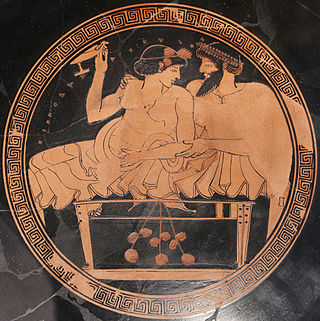
A hetaira, Latinized as hetaera, was a type of courtesan or prostitute in ancient Greece, who served as an artist, entertainer, and conversationalist in addition to providing sexual service. Custom excluded the wives and daughters of Athenian citizens from the symposium, but this prohibition did not extend to hetairai, who were often foreign born and could be highly educated. Other female entertainers made appearances in the otherwise male domain, but hetairai joined the male guests in their sexual joking, sometimes evidencing a wide knowledge of literature in their contributions.

Ancient Greek literature is literature written in the Ancient Greek language from the earliest texts until the time of the Byzantine Empire. The earliest surviving works of ancient Greek literature, dating back to the early Archaic period, are the two epic poems the Iliad and the Odyssey, set in an idealized archaic past today identified as having some relation to the Mycenaean era. These two epics, along with the Homeric Hymns and the two poems of Hesiod, the Theogony and Works and Days, constituted the major foundations of the Greek literary tradition that would continue into the Classical, Hellenistic, and Roman periods.
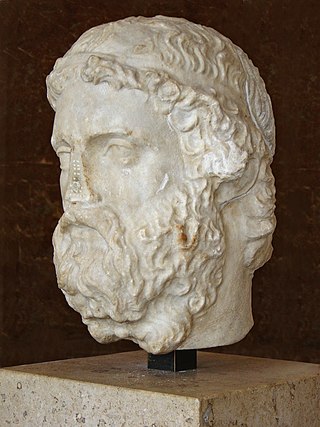
Anacreon was a Greek lyric poet, notable for his drinking songs and erotic poems. Later Greeks included him in the canonical list of Nine Lyric Poets. Anacreon wrote all of his poetry in the ancient Ionic dialect. Like all early lyric poetry, it was composed to be sung or recited to the accompaniment of music, usually the lyre. Anacreon's poetry touched on universal themes of love, infatuation, disappointment, revelry, parties, festivals, and the observations of everyday people and life.
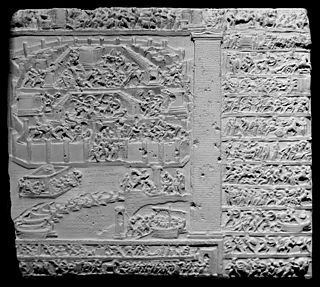
Stesichorus was a Greek lyric poet native of Metauros. He is best known for telling epic stories in lyric metres, and for some ancient traditions about his life, such as his opposition to the tyrant Phalaris, and the blindness he is said to have incurred and cured by composing verses first insulting and then flattering to Helen of Troy.
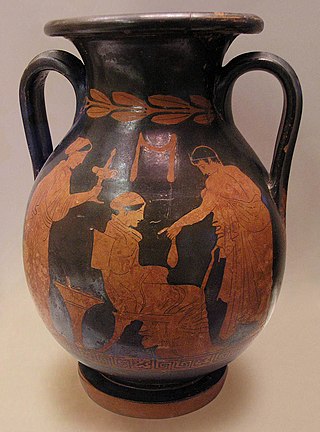
Prostitution was a common aspect of ancient Greece. In the more important cities, and particularly the many ports, it employed a significant number of people and represented a notable part of economic activity. It was far from being clandestine; cities did not condemn brothels, but rather only instituted regulations on them.
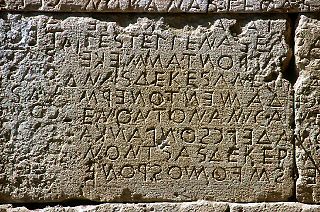
An epikleros was an heiress in ancient Athens and other ancient Greek city states, specifically a daughter of a man who had no sons. In Sparta, they were called patrouchoi (πατροῦχοι), as they were in Gortyn. Athenian women were not allowed to hold property in their own name; in order to keep her father's property in the family, an epikleros was required to marry her father's nearest male relative. Even if a woman was already married, evidence suggests that she was required to divorce her spouse to marry that relative. Spartan women were allowed to hold property in their own right, and so Spartan heiresses were subject to less restrictive rules. Evidence from other city-states is more fragmentary, mainly coming from the city-states of Gortyn and Rhegium.
Neaira, also Neaera, was a hetaera who lived in the 4th century BC in ancient Greece. She was brought to trial between 343 and 340 BC, accused of marrying an Athenian citizen illegally and misrepresenting her daughter as an Athenian citizen.
Education for Greek people was vastly "democratized" in the 5th century B.C., influenced by the Sophists, Plato, and Isocrates. Later, in the Hellenistic period of Ancient Greece, education in a gymnasium school was considered essential for participation in Greek culture. The value of physical education to the ancient Greeks and Romans has been historically unique. There were two forms of education in ancient Greece: formal and informal. Formal education was attained through attendance to a public school or was provided by a hired tutor. Informal education was provided by an unpaid teacher and occurred in a non-public setting. Education was an essential component of a person's identity.
Cleitagora or Clitagora or Kleitagora was a lyric poet mentioned by Aristophanes in his Wasps and his lost play the Danaïdes; a fragment of Cratinus also mentions her. A drinking song named "Cleitagora" is mentioned in Aristophanes' Lysistrata.
Spartan women were famous in ancient Greece for seemingly having more freedom than women elsewhere in the Greek world. To contemporaries outside of Sparta, Spartan women had a reputation for promiscuity and controlling their husbands. Spartan women could legally own and inherit property, and they were usually better educated than their Athenian counterparts. The surviving written sources are limited and largely from a non-Spartan viewpoint. Anton Powell wrote that to say the written sources are "'not without problems'... as an understatement would be hard to beat".

The Greek lyric poet Pindar composed odes to celebrate victories at all four Panhellenic Games. Of his fourteen Olympian Odes, glorifying victors at the Ancient Olympic Games, the First was positioned at the beginning of the collection by Aristophanes of Byzantium since it included praise for the games as well as of Pelops, who first competed at Elis. It was the most quoted in antiquity and was hailed as the "best of all the odes" by Lucian. Pindar composed the epinikion in honour of his then patron Hieron I, tyrant of Syracuse, whose horse Pherenikos and its jockey were victorious in the single horse race in 476 BC.

Greek lyric is the body of lyric poetry written in dialects of Ancient Greek. It is primarily associated with the early 7th to the early 5th centuries BC, sometimes called the "Lyric Age of Greece", but continued to be written into the Hellenistic and Imperial periods.
Choral poetry is a type of lyric poetry that was created by the ancient Greeks and performed by choruses. Originally, it was accompanied by a lyre, a string instrument like a small U-shaped harp commonly used during Greek classical antiquity and later periods. Other accompanying instruments in later years included other string instruments such as the kithara, barbiton, and phorminx, as well as wind instruments such as the aulos, a double-reeded instrument similar to an oboe.
Melinno was a Greek lyric poet. She is known from a single surviving poem, known as the "Ode to Rome". The poem survives in a quotation by the fifth century AD author Stobaeus, who included it in a compilation of poems on manliness. It was apparently included in this collection by mistake, as Stobaeus misinterpreted the word ρώμα in the first line as meaning "strength", rather than being the Greek name for the city of Rome.











